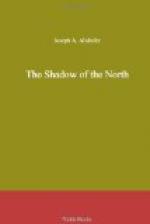Their voyage down the coast was stormy and long. Baffling winds continually beat them back, and, then they lay for long periods in dead calms, but at last they reached the mouth of the James, going presently the short distance overland to Williamsburg, the town that had succeeded Jamestown as the capital of the great province of Virginia.
Spring was already coming here in the south and in the lowlands by the sea, and the tinge of green in the foliage and the warm winds were grateful after the winter of the cold north. Robert, eager as always for new scenes, and fresh knowledge, anticipated with curiosity his first sight of Williamsburg, one of the oldest British towns in North America. He knew that it was not large, but he found it even smaller than he had expected.
He and his comrades reached it on horseback, and they found that it contained only a thousand inhabitants, and one street, straight and very wide. On this street stood the brick buildings of William and Mary, the oldest college in the country, a new capitol erected in the place of one burned, not long before, and a large building called the Governor’s Palace. It looked very small, very quiet, and very content.
Robert was conscious of a change in atmosphere that was not a mere matter of temperature. Keen, commercial New York was gone. Here, people talked of politics and the land. The men who came into Williamsburg on horseback or in their high coaches were owners of great plantations, where they lived as patriarchs, and feudal lords. The human stock was purely British and the personal customs and modes of thought of the British gentry had been transplanted.
“I like it,” said Grosvenor. “I feel that I’ve found England again.”
“There appears to be very little town life,” said Robert. “It seems strange that Williamsburg is so small, when Virginia has many more people than New York or Pennsylvania or Massachusetts.”
“They’re spread upon the land,” said Willet. “I’ve been in Virginia before. They don’t care much about commerce, but you’ll find that a lot of the men who own the great plantations are hard and good thinkers.”
Robert soon discovered that in Virginia a town was rather a meeting place for the landed aristocracy than a commercial center. The arrival of the British troops and of Americans from other colonies brought much life into the little capital. The people began to pour in from the country houses, and the single street was thronged with the best horses and the best carriages Virginia could show, their owners, attended by swarms of black men and black women whose mouths were invariably stretched in happy grins, their splendid white teeth glittering.
There was much splendor, a great mingling of the fine and the tawdry, as was inevitable in a society that maintained slavery on a large scale. Nearly all the carriages had been brought from London, and they were of the best. When their owners drove forth in the streets or the country roundabout they were escorted by black coachmen and footmen in livery. The younger men were invariably on horseback, dressed like English country gentlemen, and they rode with a skill and grace that Robert had never before seen equaled. The parsons, as in England, rode with the best, and often drank with them too.




